
As the Trump administration has stepped up immigration enforcement around the country, Americans offer mixed to negative views of some of its most high-profile actions.
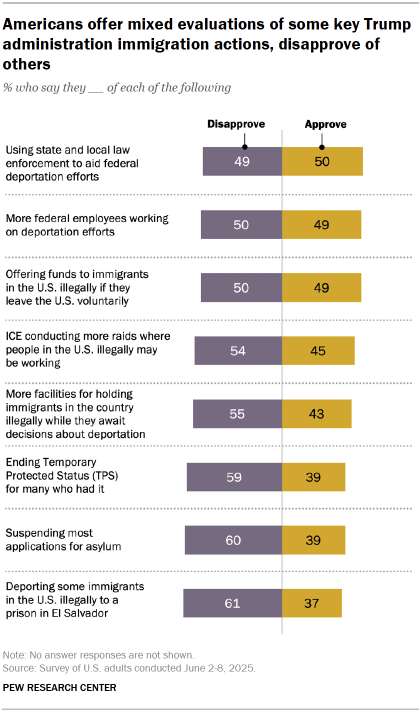
For example, public opinion is split over the use of state and local law enforcement in deportation efforts (50% approve, 49% disapprove) and offering money and travel funds to immigrants in the U.S. illegally if they leave voluntarily (49% approve, 50% disapprove).
But several other actions are far less popular:
- 60% of Americans disapprove of the suspension of most asylum applications (39% approve).
- 59% disapprove of ending Temporary Protected Status (TPS) for many immigrants who came to the United States escaping war or other disasters at home (39% approve).
- 54% disapprove of increasing Immigration and Customs Enforcement (ICE) raids on workplaces where people who are in the U.S. illegally may be working (45% approve).
A new Pew Research Center survey of 5,044 U.S. adults, conducted June 2-8, 2025, finds the Trump administration’s overall approach to immigration is viewed more negatively than positively, with 42% approving and 47% disapproving. But these evaluations – and views of specific policies – largely split along partisan lines, with Republicans broadly supportive and Democrats opposed.
- 78% of Republicans and Republican-leaning independents approve of the administration’s approach to immigration, including 51% who strongly approve. Just 12% disapprove.
- In contrast, 81% of Democrats and Democratic leaners disapprove, with 63% strongly disapproving. Just 9% approve.
(Note: Most of the survey was conducted before recent high-profile protests in Los Angeles and other cities against ICE raids on workplaces and the deployment of Marines and National Guard troops to Los Angeles by the Trump administration.)
Similarly, while about six-in-ten or more Republicans approve of each of the Trump administration immigration actions asked about on the survey, no more than a quarter of Democrats approve of most of these actions. (The sole exception is the 41% of Democrats who approve of offering money and travel funds to immigrants in the country illegally if they voluntarily leave the country.)
Read Chapter 2 for more on approval of Trump administration immigration actions and policies, including views among partisans and demographic groups.
How will the Trump administration’s immigration actions impact the country?
Asked to assess the economic impact of the Trump administration’s policies, Americans are more likely to say they expect the policies will cost taxpayers money (53%) rather than save taxpayers money (29%). And more say these policies will make the U.S. economy weaker (46%) rather than stronger (34%). About two-in-ten (19%) say they won’t have much impact on the economy.
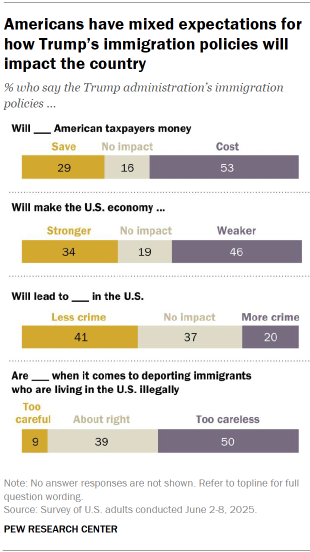
However, by about two-to-one, Americans expect the policies to result in less crime (41%) rather than more crime (20%). Nearly four-in-ten (37%) say they will have little impact on crime in the U.S.
Half of Americans say the administration’s approach to deporting immigrants who are living in the U.S. illegally is “too careless.” About four-in-ten (39%) say the administration’s approach has been about right, while 9% say it’s been too careful.
Read Chapter 2 for more on the public’s views of how the administration’s immigration policies will impact the country.
How should the country handle undocumented immigrants now living in the U.S.?
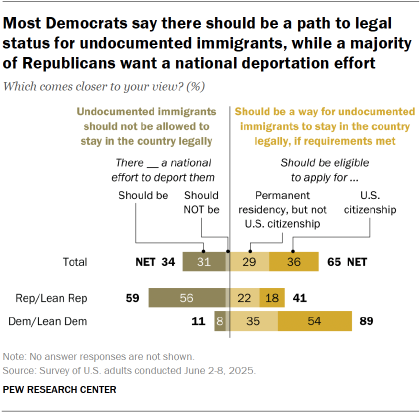
As has long been the case, the majority of Americans (65% today) say that there should be a way for undocumented immigrants to stay in the country legally, with 36% saying these immigrants should be eligible for citizenship if they meet certain requirements.
About a third of Americans (34%) say undocumented immigrants should not be allowed to stay legally, with nearly all of this group saying that there should be a national law enforcement effort to deport them (31% of Americans overall).
There are wide partisan divisions in these views, and these divides are wider today than they were a few years ago:
- Today, 41% of Republicans and 89% of Democrats say there should be a way for undocumented immigrants to stay in the U.S. legally.
- In 2017, 61% of Republicans said this, as did 88% of Democrats.
- The share of Republicans saying there should be a national effort to deport those in the country illegally has grown substantially over the last eight years – 56% say this today, up from 34% in 2017.
Republicans and Democrats have different views about what is acceptable when it comes to federal deportation efforts:
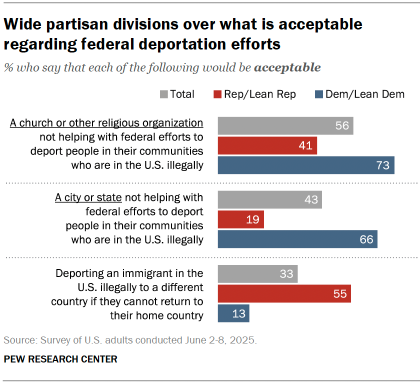
- 55% of Republicans say it would be acceptable to deport immigrants to a different country if they cannot return to their home country.
- By comparison, 13% of Democrats say this would be acceptable.
When it comes to working with federal deportation efforts:
- 73% of Democrats, compared with 41% of Republicans, say it would be acceptable for a church or religious organization to not help with federal efforts to deport people in their communities who are in the U.S. illegally.
- 66% of Democrats and 19% of Republicans say it would be acceptable for a city or state to not help federal deportation efforts.
Read Chapter 1 for more on Americans’ views about policies regarding undocumented immigrants currently living in the U.S.
Other key findings
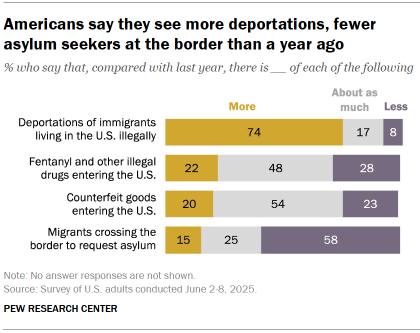
Majorities say deportations have increased, and asylum-seeking has decreased, compared with last year. Majorities of both Republicans (79%) and Democrats (69%) say deportations are up this year. A majority of Americans (58%) also say there are now fewer people crossing the border to request asylum in the U.S., with Republicans particularly likely to say this (70%). Public assessments of whether the entry of illegal drugs and counterfeit goods are changing are more mixed.
A 56% majority of Americans now favor expanding the wall along the U.S. border with Mexico, up from 46% in 2019. Republican support for a border wall remains high (88% support expansion). Democratic support for expanding the wall remains low but has increased to 27% from 14% six years ago.
Trump’s approval rating – 41% – is essentially unchanged over the last few months, but remains lower than in the first weeks of his term. And the share who now say Trump’s actions as president have been worse than expected is 13 points higher than in February (35% then, 48% now), while the share who say his actions have been better than expected has declined (28% then, 21% now).




